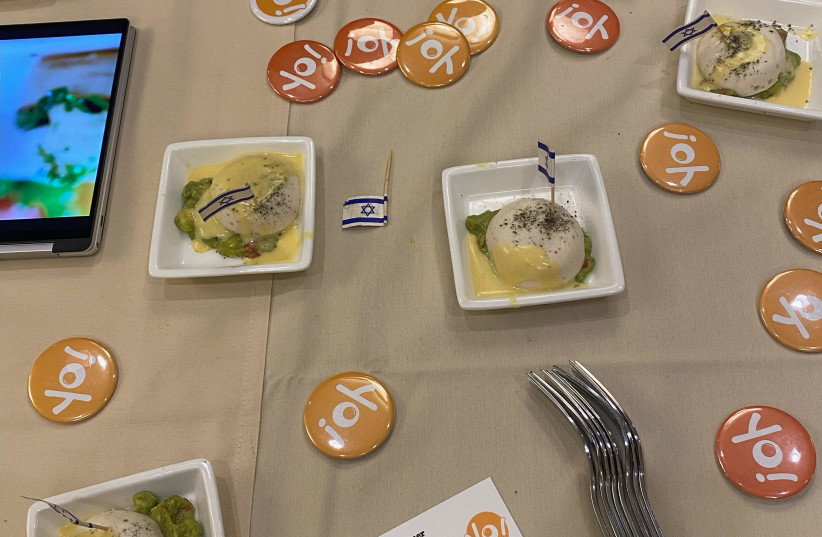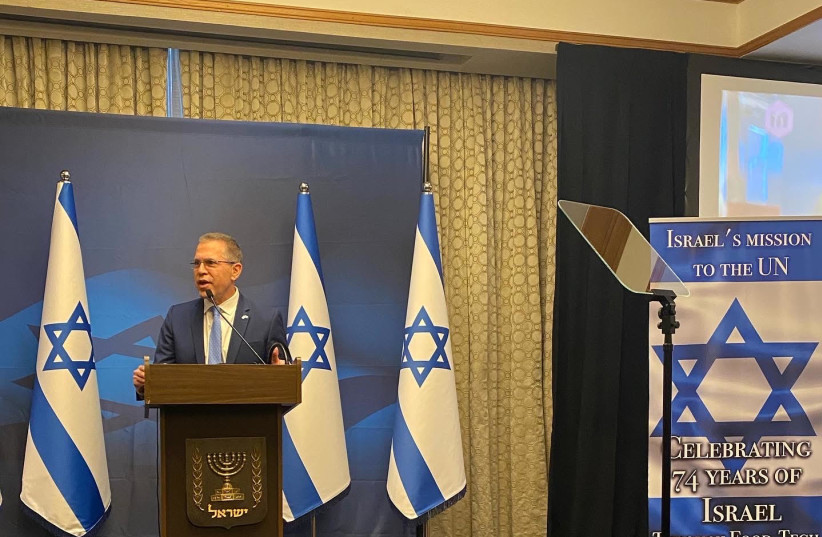NEW YORK – As scores of United Nations ambassadors from around the world gathered to taste Israeli innovations in the food-tech sector – cream cheese made without cow’s milk, chickpea-based meat, vegan eggs, macadamia milk – Israel’s ambassador to the UN Gilad Erdan urged his colleagues to etch the delectable event into their memories.
“There is immense bias at the United Nations,” Erdan told approximately 150 ambassadors, officials and Jewish leaders on Thursday. “As representatives of your states, that sometimes vote singling out Israel," he urged them to remember this event.
“Beyond being a refuge for a people still suffering from prejudice and violence, Israel is a hub of innovation with the goal of contributing to solving the world’s problems. Israel should be singled out, but only for the immense good it is bringing to the world.”
Following his speech, Erdan led the diplomats in the singing of Hatikvah, Israel’s national anthem.
The event was held at a midtown Manhattan hotel just blocks away from the UN Turtle Bay headquarters, hosted by Israel’s Mission to the UN in collaboration with The Good Food Institute to coincide with the Jewish state’s 74th Independence Day.

Presenters included Osnat Shostak, head of business development of Supermeat, an Israeli food-tech company that makes slaughter-free meat produced directly from animal cells.
Based in New York, Shostak told The Jerusalem Post that the Empire State is a rising hub for food-tech innovation, an industry of technologies that are disrupting the manner in which we make and distribute food by increasing sustainability and affordability.
“We grow our own chickens,” she said. “Look at how much chicken prices around the world are increasing. We are able to produce them in a more affordable way.”
In total, five leaders of Israeli food-tech start-ups presented and offered samples to taste, explaining that the up-and-coming industry intends to address global hunger and the other macro-challenges facing the world, including one of the most pressing questions plaguing humanity: How can the world feed 9.7 billion people by 2050?
The displayed companies were: Supermeat; Innovopro – “The Chickpea Protein Revolution”; Milkadamia, vegan macadamia milk producers; Alfred's FoodTech, plant-based meat and cheese alternatives, ReMilk, producer of cultured milk; and YoEgg, creators of the plant-based egg.
The showcase was held against the backdrop of Russia’s ongoing invasion of Ukraine, which began February 24. Ukraine’s UN ambassador, Sergiy Kyslytsya, told the Post he was impressed with the Israeli food technology presented. He noted that “unfortunately there are some political implications.”

The ambassador said that Israeli innovation could help fight world hunger, which is sharply on the rise as a result of the war in Ukraine disrupting the supply chain. “Some of the technologies I am seeing here, for example hydroponics, could absolutely help,” Kyslytsya told the Post.
“Israelis have unique technologies; they are so spectacular. I am amazed and sure that there will be an incredible market for these Israeli technologies, not only in developed countries that can afford it, but in the Third World as well,” he said.
“The world will absolutely benefit from Israeli innovation.”
